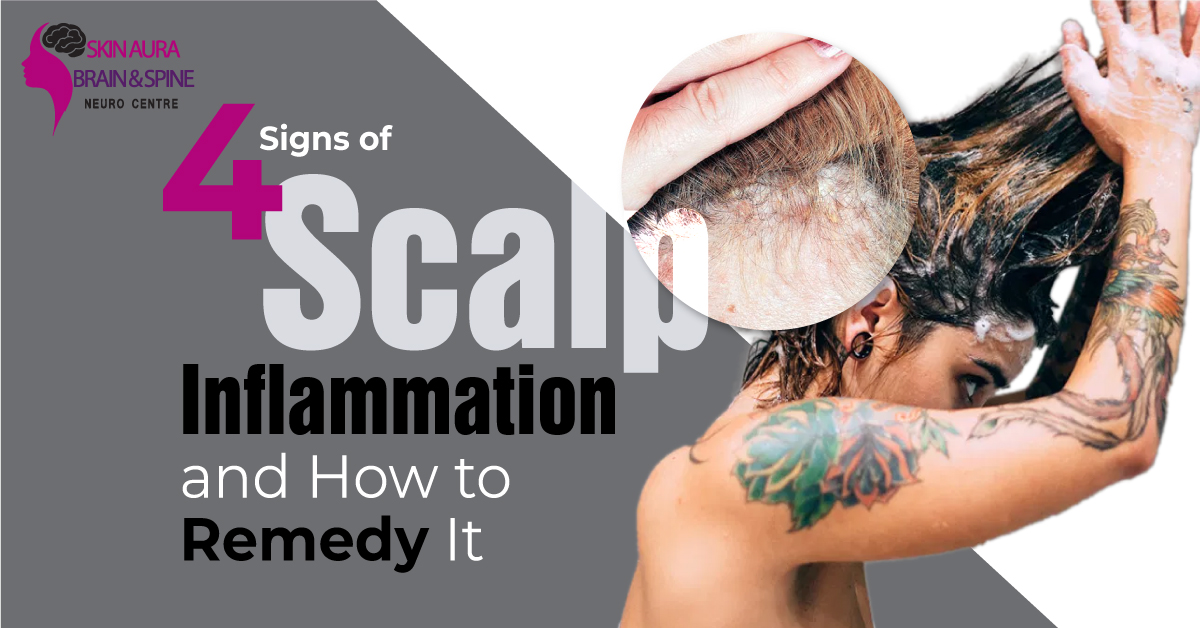A wide range of medical diseases cause inflammation of the scalp and thinning of the hair. Microorganisms, allergens, or pollutants all have the potential to cause it. Although inflammation isn’t always a cause for alarm, it can signify something more serious.
What Is Scalp Inflammation?
Scalp inflammation is a type of inflammation that only affects the scalp. Be aware that it’s not an illness but rather a process. As a member of the immune system, it is responsible for releasing inflammatory cells when a person is ill, injured, or unwell.
Wound healing can benefit from it. For long periods, too much of it can harm healthy cells.
The build-up is evident
When there’s build-up, it’s not necessarily an indication but rather a precursor to inflammation. Inflammation is caused by product build-up, oil, and flakiness in your hair follicles. Chronic buildup can lead to inflammation of the scalp, leading to the other symptoms listed below. While this is very simple to resolve, it may take some time to keep under control.
Even a tiny quantity of dandruff and scaling can smother the hair follicles and cause them to fall out. That’s why it’s critical to catch these warning signs early and take action before things get out of hand.
If the accumulation is particularly bad, it can even cause the hair to fall out because of the inflammation around the hair follicle.
That’s why you should first and foremost examine whatever build-up you have and take the required steps to remove any unwanted residue—and why you shouldn’t skip a double-cleanse in the shower.
It’s a real pain
Even though it’s true that we carry a lot of our stress in our heads and scalps (scalp tension is real, people), the same feelings of discomfort can also indicate follicular inflammation, which can lead to hair loss. There’s a reasonable probability your scalp is hurting if you have any irritation.
Because there is a tiny area between the skull and the skin, any swelling might cause the scalp to feel tight
No matter how minor the swelling may be, it can cause pain, itching, and other unpleasant symptoms in the skull’s nerves. Your scalp may be inflamed beneath the surface, and a dermatologist should be consulted if you are suffering any discomfort.
It’s a bright shade of red
Some of the causes of a red scalp include over-washing, harsh chemicals in hair products, and skin diseases such as eczema or psoriasis.
The scalp might get inflamed if you overwash your hair with harsh sulfates, which can irritate.
Two types of inflammation can cause scalp redness. Perifollicular erythema is the first type of redness surrounding the follicle, and it is the most common type of erythema. If left untreated, it can cause hair loss and scars on the scalp. This is a relatively uncommon disorder.
There is a difference between the two. The second is a little superficial and far more common. Psoriasis and seborrheic dermatitis (often called “Sebo”) are the two most prevalent causes of redness and scaling on the scalp.
These illnesses have no known cure. On the other hand, Scalp swelling treatment in Gurgaon from Skin Aura Brain and Spine Neuro Centre is pretty effective at controlling them.
There are dots or spots of color
Even if you don’t feel any pain or redness on your scalp, flaking is a form of inflammation. These flakes can signal inflammation even if there isn’t any visible redness or discomfort on the skin’s surface, which is common in many cases.
The flaking of your sweater, even if it’s black, is usually due to seborrheic dermatitis. In addition, anti-inflammatory topicals should be used to alleviate the swelling and redness.
Because many people see flakes and equate them with dandruff (a common cause of scalp dryness), they may choose to skip a few washes or use dry shampoo instead. In reality, you should wash your hair more frequently, not less frequently as your instinct tells you to do.
So that topical anti-inflammatory can reach the cause of the inflammation and treat it, you should clean your scalp to remove as much scaling as possible.
So your scalp is inflamed, correct? What options are available to you?
If you’re suffering from any of these symptoms, you should first try to remove as much of the scaling as possible before administering any Scalp swelling treatment in India.
When there are a lot of scales, the medication and therapies can’t get to the area where they’re most effective.
There are a variety of ways to reduce the size of an object. Before shampooing, apply a small amount of oil to the scalp. This ensures that the hair follicles receive adequate food and that debris and accumulation are removed from the hair follicles.
If you want a softer sulfate-free shampoo, you should always double-cleanse. You’ll achieve salon-quality shine and a deeper clean with a second cleaning.
